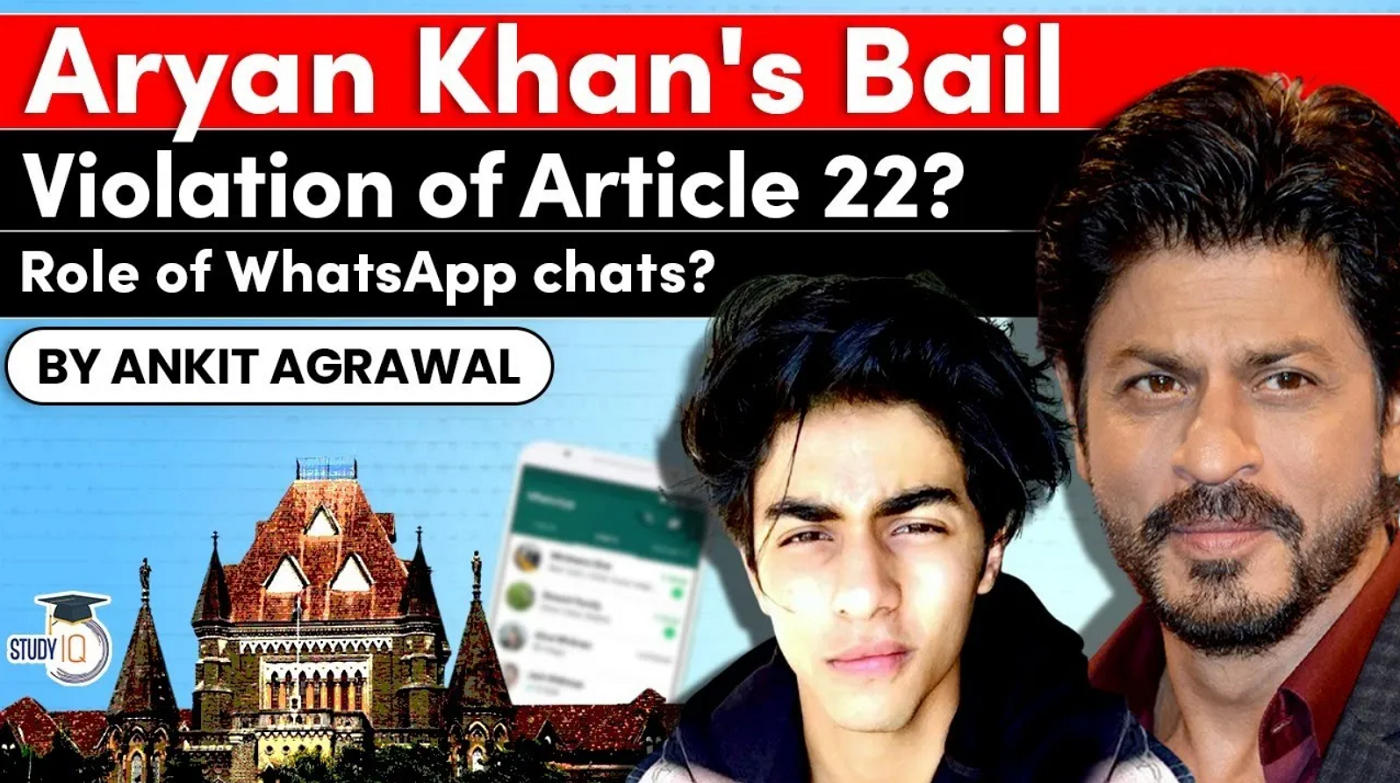Table of Contents
What has happened?
- The Bombay High Court has granted bail to Aryan Khan in connection with the alleged cruise ship drug case.
- Justice NW Sambre also allowed bail to his friends and co-accused in the matter, Arbaaz Merchant and Munmun Dhamecha.
- Though bail has been allowed, the three accused will be released tomorrow after specification of the bail conditions in the detailed order.


- Bail was granted after hearing Senior Advocate Mukul Rohatgi for Aryan Khan and ASG Anil Singh for the Narcotics Control Bureau.
- The Bench also heard Senior Advocate Amit Desai for
- Arbaaz Merchant and Advocate Ali Kashiff Khan Deshmukh for Munmun Dhamecha.
Aryan Khan’s case
- It was argued on behalf of Aryan Khan, represented by Senior Advocate Mukul Rohatgi, that his arrest was made in sheer violation of Article 22 of the Constitution,
- Inasmuch as he was not informed about the correct grounds for arrest.

- On his connection with Aachit Kumar, an alleged drug peddler, Rohatgi submitted on behalf of Khan.
- “Aachit was arrested with 2.4 gms. Dealers cannot have just 2.4 gms.“
- He added that it’s a clear case of no possession, no consumption and no recovery of drugs.
WhatsApp chat
- Rohatgi also submitted that none of the WhatsApp chats recovered from Khan’s phone relate to the cruise party.
- It is further argued that WhatsApp messages have no evidentiary value and a person’s liberty for an offence punishable with one year cannot be deprived on such basis.
- Senior advocate Amit Desai argued in the Bombay High Court and said “Punjab and Haryana High Court and Bombay High Court have held that WhatsApp chats are inadmissible”.
- “Only thing they are using to keeping us in custody is WhatsApp chats, which were from before. There are no WhatsApp chats in any manner whatsoever supporting conspiracy theory”.
- “They (devices) were seized but there is no panchnama.
- Based on this, there has been speculation of drug trafficking, it is absurd.
- The device is not with us, there is no panchnama and seizure report in relation to phones.
- Punjab and Haryana HC and Bombay HC have held that WhatsApp chats are inadmissible.”
- It was also contended that NCB’s case relies heavily on “voluntary” statements given under Section 67 of the NDPS Act,
- Which are inadmissible in evidence as per last year’s Supreme Court judgment in the Tofan Singh case.
NCB’s case
- ASG Anil Singh on behalf of NCB argued that in the accused’ WhatsApp chat there is a specific reference to bulk quantity, and that Khan is not a first–time consumer.
- Regarding admissibility of the chats, the ASG said they have a 65B certificate as required under the Indian Evidence Act and the chats are thus admissible.
- “Accused number 1 (Aryan Khan) is not a first-time consumer,” said the NCB’s lawyer Anil Singh, the Additional Solicitor General.
- “He is a regular consumer since last few years and he has been procuring drugs.
- There is a reference of procuring drugs in commercial quantity and the drugs are hard drugs. He has been in contact with peddlers,“ said Mr Singh.
- He pointed out that when Khan was apprehended, multiple drugs were found from 8 people (of the 11 people named in the secret note received by the agency).
- Thus, a cumulative effect has to be seen.
- “It has to be investigated… cumulative drug quantity was of commercial quantity,” ASG Anil Singh said.
Mukul Rohatgi’s argument
- Mr Rohatgi countered that there were 1,300 people on the cruise.
- “There are 500 rooms in the Taj. If two people are consuming in two rooms will you hold the entire hotel?
- There is absolutely no material for purposes of conspiracy,“ he said.
“Bail is rule, jail is exception”
- It is a legal doctrine that was laid down by the Supreme Court of India in a landmark judgement of State of Rajasthan vs. Balchand alias Baliya (AIR 1977 2447).
- The legal doctrine, in this case, was laid down by Justice V. Krishna Aiyer, who based it on fundamental Rights guaranteed by the constitution of India.
- Every accused person is presumed to be innocent until proved guilty.
- The effect of granting bail is not to set the accused free, but to release him from custody and to entrust him to his own bond.
- Thus, Bail is security obtained from a person arrested regarding an offence for the purpose of securing his presence during the course of a trial.
- Section 436 of the Code of Criminal Procedure, 1973, lays down that a person accused of a bailable offence under I.P.C. can be granted bail.
- On the other hand, Section 437 of the Code of Criminal Procedure,1973 lays down that the accused does not have the right to bail in non-bailable offences.
- It is the discretion of the court to grant bail in case of non-bailable offences.
Q) Guwahati High Court does not have territorial jurisdiction over which state?
- Meghalaya
- Arunachal Pradesh
- Mizoram
- Nagaland
Latest Burning Issues | Free PDF























 WhatsApp
WhatsApp